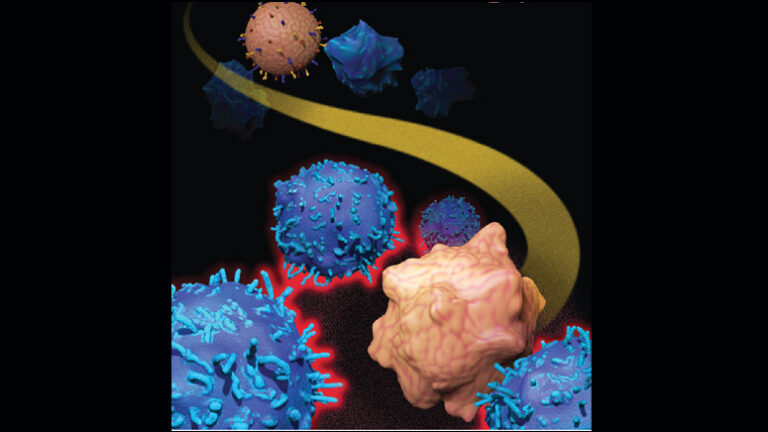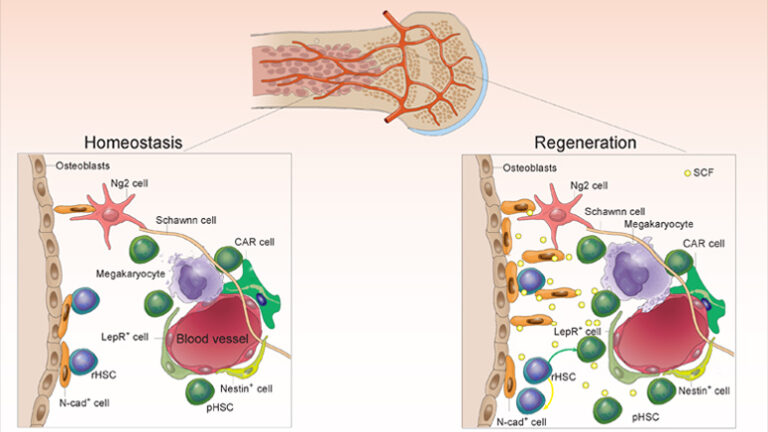News

23 May 2023
A niche for cancer
Stowers scientists are unraveling the mechanisms governing cancer stem cells
Read Article
We seek to understand the regulation of stem cells within blood-forming and intestinal systems and how this relates to cancer in humans.
Jump to:
Publications
Research Summary
Development and Regeneration, Genetics and Genomics, Molecular and Cell Biology
Human cell lines, Mice
The Li Lab focuses on the hematopoietic (blood-forming) and intestinal systems to study stem cell development. Hematopoietic stem cells (HSCs) and intestinal stem cells (ISCs) are essential for health. In addition to renewing themselves, HSCs differentiate into red and white blood cells and platelets, and ISCs give rise to all types of intestinal epithelial cells for nutrient absorption, pathogen defense, and communication with the brain.
The Li Lab is working to understand how microenvironmental (niche) signals or intrinsic genetic and epigenetic mechanisms regulate stem cell proliferation and differentiation in the hematopoietic and intestinal systems. The lab is also looking at how glitches or changes in these systems are associated with human diseases such as leukemia and colon cancer.
The lab discovered two sub-populations of blood forming cells, one active and one quiescent or waiting to become active – a kind of reserve population. The finding has implications for cancer treatment because tumors also contain active stem cells and a reservoir of backup cells, which may help explain why some tumors become resistant to treatment. The lab discovered that abnormal activation of Wnt and PI3K-Akt empowers leukemia stem cell drug-resistance and immune escape, in which beta-catenin, a downstream effector of Wnt signaling, can directly regulate multiple immune-checkpoint genes.
The Li Lab reported identification of therapy refractory tumor-initiating stem cells (TrTSC) in intestinal adenoma and uncovered that TrTSC shapes its microenvironment into an immunosuppressive barrier and a pro-tumorigenic niche.
Principal Investigator
Investigator
Stowers Institute for Medical Research
Linheng Li, Ph.D., joined the Stowers Institute in 2000 and focuses on stem cell and cancer research. He is an Investigator and faculty member for the graduate school in addition to co-leading the Cancer Biology initiative at the University of Kansas Cancer Center.

Linheng Li, Ph.D., joined the Stowers Institute in 2000 and focuses on stem cell and cancer research. He is an Investigator and faculty member for the graduate school in addition to co-leading the Cancer Biology initiative at the University of Kansas Cancer Center.

"Stem cell biology is the base for regenerative medicine as well as a key to understanding cancer. I think in my life, the next five or ten years, we will help translate what we discovered into clinical settings, including the ability to expand 'good' or healthy blood-forming stem cells and target 'bad' or cancer stem cells, both of which involve the niche concept."

News

23 May 2023
Stowers scientists are unraveling the mechanisms governing cancer stem cells
Read Article
News

20 April 2020
The study’s researchers found that low doses of the anthracycline antibiotic doxorubicin inhibit the interaction between two molecular pathways that work closely together to promote tumor growth and resistance to therapy. The targeted approach also clears the way for cancer-targeting immune cells to do their work, an unexpected and novel finding, according to the study authors.
Read Article
Press Release

15 January 2019
New research from the Stowers Institute for Medical Research has identified a backup for an important biological system – the hematopoietic system, whose adult stem cells constantly replenish the body’s blood supply.
Read Article
He X, Smith SE, Chen S, Li H, Wu D, Meneses-Giles PI, Wang Y, Hembree M, Yi K, Zhao X, Guo F, Unruh JR, Maddera LE, Yu Z, Scott A, Perera A, Wang Y, Zhao C, Bae K, Box A, Haug JS, Tao F, Hu D, Hansen DM, Qian P, Saha S, Dixon D, Anant S, Zhang D, Lin EH, Sun W, Wiedemann LM, Li L. Cell Rep. 2021;36:109674.doi: 10.1016/j.celrep.2021.109674.
Overcoming Wnt-beta-catenin dependent anticancer therapy resistance in leukaemia stem cells
Perry JM, Tao F, Roy A, Lin T, He XC, Chen S, Lu X, Nemechek J, Ruan L, Yu X, Dukes D, Moran A, Pace J, Schroeder K, Zhao M, Venkatraman A, Qian P, Li Z, Hembree M, Paulson A, He Z, Xu D, Tran TH, Deshmukh P, Nguyen CT, Kasi RM, Ryan R, Broward M, Ding S, Guest E, August K, Gamis AS, Godwin A, Sittampalam GS, Weir SJ, Li L. Nat Cell Biol. 2020;22:689-700
Zhao M, Tao F, Venkatraman A, Li Z, Smith SE, Unruh J, Chen S, Ward C, Qian P, Perry JM, Marshall H, Wang J, He XC, Li L. Cell Rep. 2019;26:652-669 e656.
Qian P, De Kumar B, He XC, Nolte C, Gogol M, Ahn Y, Chen S, Li Z, Xu H, Perry JM, Hu D, Tao F, Zhao M, Han Y, Hall K, Peak A, Paulson A, Zhao C, Venkatraman A, Box A, Perera A, Haug JS, Parmely T, Li H, Krumlauf R, Li L. Cell Stem Cell. 2018;22:740-754 e747.
Suppression of m(6)A reader Ythdf2 promotes hematopoietic stem cell expansion
Li Z, Qian P, Shao W, Shi H, He XC, Gogol M, Yu Z, Wang Y, Qi M, Zhu Y, Perry JM, Zhang K, Tao F, Zhou K, Hu D, Han Y, Zhao C, Alexander R, Xu H, Chen S, Peak A, Hall K, Peterson M, Perera A, Haug JS, Parmely T, Li H, Shen B, Zeitlinger J, He C, Li L. Cell Res. 2018. Author Correction: Cell Res 2018:1-14. doi.org/10.1038/s41422-018-0072-0. Published online July 2018.;28:904-917.
Qian P, He XC, Paulson A, Li Z, Tao F, Perry JM, Guo F, Zhao M, Zhi L, Venkatraman A, Haug JS, Parmely T, Li H, Dobrowsky RT, Ding WX, Kono T, Ferguson-Smith AC, Li L. Cell Stem Cell. 2016;18:214-228.
